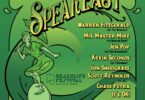There are works of literature in the American canon that over the years have achieved a certain iconic status. These works are as different as sibling children; though distinct in myriad ways, they each carry a common element that binds them – the power to pierce the public consciousness like a syringe through epidermis and strike at the very veins of the nation. They accomplish this by laying bare the sacred institutions that form the backbone of American society, from the church (The Crucible) to industry (The Jungle) to the family (Who’s Afraid of Virginia Woolf?) to society itself (Animal Farm.) It is precisely this cultural resonance that elevates these works to the level of near-universal appreciation and a place in the pantheon of great American literature.
12 Angry Men, playing now through May 6 at the Ahmanson Theater, is not one of these works of literature. In fact, it’s not literature at all. It is a television screenplay that was written by Reginald Rose and produced by CBS in 1954, when the medium was still in its infancy. It was then adapted into a 1957 motion picture starring Henry Fonda and directed by Sidney Lumet, then re-adapted into a stage play, where it remained for thirty years. The play returned to the small screen in 1997 with a cast that included Jack Lemmon, James Gandolfini, and Tony Danza, and was finally brought back to the stage in its most recent incarnation with Richard Thomas and George Wendt spearheading a wonderful ensemble cast. But despite its multiple incarnations, decidedly un-literary pedigree, and dated references to Kruschchev and the days when a fella could light up indoors with the same casual ease as taking a sip of water, 12 Angry Men has managed to earn its place among the classics of American literature. This is because it takes two basic but treasured tenets of American society – the criminal justice system and the right to a trial by one’s peers – and casts them in glaring white light.
The brilliance of 12 Angry Men is that its premise is lodged within a very ordinary life situation. Every American citizen will be summoned to jury duty someday, and most will do everything they can to get out of it. But downtown, for a little over an hour on a Friday or Saturday night, there is no getting out of it. The audience is locked in that sweltering room with the quarreling jurors, and the lack of an intermission reinforces the fact that nobody goes home until a unanimous verdict has been reached. The audience becomes more than mere spectators to the verbal fireworks that take place on the stage; but more like a collective thirteenth juror, close enough to smell the cigarettes and feel the seismic emotional shifts in the room as the tension waxes and wanes. Our ballot counts on an unseen but not unfelt level – he might not be addressing us directly, but isn’t Juror #8 trying to convince us of the defendant’s innocence as well as his fellow deliberators?
Given the television roots of the material, it is entirely appropriate that actors known primarily for their television work play two main roles – Richard Thomas as Juror #8, the lone voice of dissent, and George Wendt as the Foreman. Wendt’s character is not too unlike Norm – he sits at the end of the table, gently steers the action with the occasional pointed remark, but generally stays out of the way. In fact, Wendt’s Foreman is the least compelling of all of the members of the jury, including a boorish loudmouth, a stodgy intellectual, a genteel old man, a European immigrant, a bookish nerd, another boorish loudmouth, a slick ad man, an unabashed racist, a couple of blue-collar Joes, and, of course, Thomas’ Juror #8.
The piece hinges upon the performance of Juror #8, as he is the character that advances the story at nearly every turn and to whom the meatiest material is given. The actor who wears those shoes must be assertive enough to make you believe he can sit squarely on the hottest seat in that room and defend himself from the bombastic verbal onslaughts of his own peers without demonstrating any trace of aggression. It’s a fine line to walk. Both Fonda and Lemmon played the part with more than a bit of that aw-shucks, Columbo-style intonation, and Thomas can’t help but dwindle there a little during the piece’s quieter moments. But he’s not afraid to let the thunder roll, and his finest work is in the more explosive scenes, particularly the personal back-and-forth between him and Juror #3.
This is not to say that Thomas’ Juror #8 single-handedly carries the play. The stellar performances from the supporting cast are what give the piece its authenticity, and everyone here makes the most out of every opportunity. Particularly outstanding are Alan Mandell as the elderly gentleman with a bit of fire left in his belly, David Lively as the bitterly prejudiced Juror #11, and Randle Mell as Juror #3, the most difficult to persuade. The seamless way that the dialogue flows between the characters is a testament to the skill and timing of all of the actors on stage – not just the ones with the juiciest parts.
By the time the simmering tension has boiled over and a verdict has been reached, the audience has seen more than just a glimpse at the contrasting personalities of these twelve men, but has rather taken a hard look at one of the fundamental rights of American citizenship in action. The facts of the case are almost incidental – in the end, it is the system itself that triumphs, not the imperfect men who comprise it.
12 Angry Men, through May 6 at the Ahmanson Theatre, 135 N. Grand Avenue, Los Angeles, www.centretheatregroup.com.










